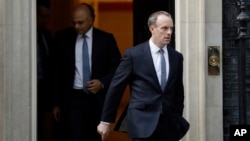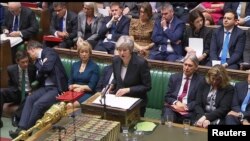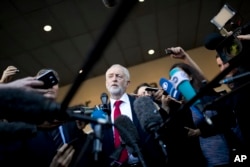"There will be difficult days ahead," Britain's Prime Minister Theresa May said on the steps of Downing Street when announcing she had secured the backing of her Cabinet for a contentious Brexit divorce agreement after an impassioned and at times angry five-hour meeting.
Those words quickly turned out to be an understatement on Thursday.
Shortly after she spoke, her Brexit minister, Dominic Raab, who helped draft the agreement, resigned in protest, saying he could not in "good conscience" support the terms of a deal that hardline Brexiteers argue places Britain in a subordinate relationship with the European Union, one the country wouldn't be able to quit without Brussels' consent.
A junior minister preceded Raab's departure and three ministers followed as furious Brexiteers plotted openly to oust May as Conservative leader, delivering serious blows to her authority.
Now, the future of a deal that's taken more than a year to negotiate and the fate of the Conservative government itself are in doubt.
Questions also are being raised about calling a snap general election, which could see a Labor win, or holding a second Brexit referendum that could overturn the original vote to leave the EU.
Another possibility is that with the clock ticking toward a formal departure from the EU in March 2019, Britain may end up crashing out of the bloc without any exit deal, an outcome analysts and business leaders say would roil the economy.
Facing the House of Commons on Thursday, May came under sharp attacks from opposition lawmakers and from her own ranks, who claim the deal amounts to a "treaty of submission."
May had hoped to rally the different factions in her warring party — and a divided country — around the deal; but, the bid appears to have failed. Remaining characteristically stoic, May faced some of the most hostile House of Commons questioning a prime minister has faced since 1940 from his or her party. At times during three hours of questioning, there were cries of "rubbish." One lawmaker — by profession a psychologist — accused May of being "in denial."
She maintained that the agreement is the best deal Britain can get. The draft EU deal would see Britain remain in a customs union for several years with the European Union after it exits the bloc in March, but with an unclear legal path to quitting the customs arrangement while a fuller, but so far ill-defined, trade deal is negotiated.
May told a packed House of Commons, which alternately was somber and uproarious, that she was acting in the national interest and the "draft treaty will ensure we leave the EU in a smooth and orderly way." Her remark drew laughter and jeers.
"I don't pretend this has been a comfortable process or that either we or the EU are entirely happy with all of the arrangements that have been included," she said. "Voting against the deal would take us back to square one and it would mean more uncertainty and more division, and the failure to deliver on the decision of the British people that we should leave the EU."
May also said, "The choice is clear. We can choose to leave with no deal, or risk no Brexit at all. Or we can choose to unite and support the best deal that can be negotiated."
Jeremy Corbyn, the leader of the opposition Labor Party, said May was offering a "false choice between no deal and this deal," which he said "represents a huge and damaging failure." He added, "After two years of bungled negotiations, the government has produced a botched deal" which "does not have the backing of parliament or the country as a whole."
The leader of the Scottish Nationalist Party, Ian Blackford, said May "looks desperate and defeated" and is "trying to sell a deal that is dead in the water."
The beleaguered prime minister, however, appears determined to move forward.
Several Euro-skeptic Conservative lawmakers were reported to have submitted letters to party authorities in parliament demanding a confidence vote on her leadership, saying it was time to change the leader. Forty-eight letters would trigger a vote automatically.
The largely Protestant Northern Ireland party that May's minority government relies on to stay in office has said it will vote against the draft Brexit agreement when it formally comes before parliament next month. Few analysts believe May will have sufficient votes to get the agreement approved.
EU summit
As the political drama played out Thursday in London, the European Commission said EU leaders will meet November 25 for a summit to rubber stamp the withdrawal agreement. Officials in Brussels acknowledged the plan could go awry depending on events in London.
They said British negotiators would get a frosty reception if they return looking for major amendments to the proposed deal, arguing several EU national governments believe too much was given away to Britain already.
Exhibiting her trademark resilience Wednesday, Prime Minister May indirectly rebuffed calls by hardline Brexiteers in her party to step aside and make way for a new party and British leader. In a news conference at Downing Street, she said, "I believe with every fiber of my being that the course I have set is right."
Asked if she would fight off a leadership challenge, she said, "Yes," adding that leadership is about making the right decisions, not the easy ones. She said, "This is a Brexit that delivers on the priorities of the British people."
It isn't clear that Britons feel she is doing so. In a poll Thursday for Sky News, more than half of those surveyed say they favor Britain remaining in the EU, with 32 percent saying they wanted to leave without an agreement and 14 percent backing May's deal. Fifty-five percent of those polled want another referendum.








